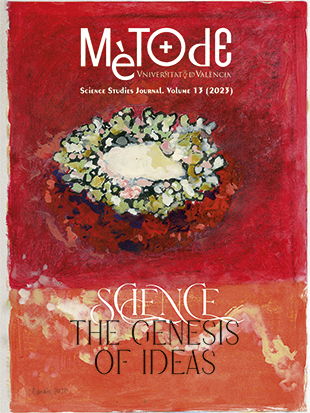Reimaginar una sola salud: Una perspectiva desde las ciencias sociales
DOI:
https://doi.org/10.7203/metode.13.23821Palabras clave:
una sola salud, marco interdisciplinario, riesgo, ciencias sociales, zoonosis Resumen
Resumen
Una sola salud es un marco de interpretación centrado en las interacciones entre seres humanos, animales y ecosistemas, tanto en términos de servicios como de prácticas sanitarias. Las decisiones humanas están en el centro de los retos que plantea este marco, por lo que comprender cómo se perciben estas conexiones y cómo se actúa ante ellas es fundamental. Los estudios en este campo se han basado principalmente en las ciencias naturales y de la salud, y será necesario un esfuerzo adicional para aprovechar también el potencial que tiene incorporar la investigación social a este enfoque. En este artículo sugerimos diversas áreas de estudio que podrían facilitar el avance en este sentido.
 Descargas
Descargas
 Citas
Citas
Ahmadun, F.-R., Wong, M. M. R., & Said, A. M. (2020). Consequences of the 2004 Indian ocean tsunami in Malaysia. Safety Science, 121, 619–631. https://doi.org/10.1016/j.ssci.2019.05.016
Beall, J. M., Casola, W. R., Peterson, M. N., Larson, L. R., Carr, W. A., Seekamp, E., Stevenson, K. T., & Jackson, S. B. (2021). Cultural cognition and ideological framing influence communication about zoonotic disease in the era of Covid-19. Frontiers in Communication, 6, 645–692. https://doi.org/10.3389/fcomm.2021.645692
Béné, C., Mehta, L., McGranahan, G., Cannon, T., Gupte, J., & Tanner, T. (2018). Resilience as a policy narrative: Potentials and limits in the context of urban planning. Climate and Development, 10(2), 116–133. https://doi.org/10.1080/17565529.2017.1301868
Bourbeau, P. (2018). A genealogy of resilience. International Political Sociology, 12(1), 19−35. https://doi.org/10.1093/ips/olx026
Courtenay, M., Sweeney, J., Zielinska, P., Brown Blake, S., & La Ragione, R. (2015). One Health: An opportunity for an interprofessional approach to healthcare. Journal of Interprofessional Care, 29(6), 641–642. https://doi.org/10.3109/13561820.2015.1041584
Economic Research Service. (2021). The meatpacking industry in rural America during the Covid-19 pandemic. https://www.ers.usda.gov/covid-19/rural-america/meatpacking-industry
Florin, M.-V., & Linkov, I. (Eds.). (2016). IRGC resource guide on resilience. EPFL International Risk Governance Center. https://doi.org/10.5075/epfl-irgc-228206
Hernando-Amado, S., Coque, T. M., Baquero, F., & Martínez, J. L. (2020). Antibiotic resistance: Moving from individual health norms to social norms in one health and global health. Frontiers in Microbiology, 11, 1914. https://doi.org/10.3389/fmicb.2020.01914
Hueston, W., Appert, J., Denny, T., King, L., Umber, J., & Valeri, L. (2013). Assessing global adoption of one health approaches. EcoHealth, 10(3), 228–233. https://doi.org/10.1007/s10393-013-0851-5
Lapinski, M. K., Funk, J. A., & Moccia, L. T. (2015). Recommendations for the role of social science research in One Health. Social Science & Medicine, 129, 51–60. https://doi.org/10.1016/j.socscimed.2014.09.048
Nowling, W. D., & Seeger, M. W. (2020). Sensemaking and crisis revisited: The failure of sensemaking during the Flint water crisis. Journal of Applied Communication Research, 48(2), 270–289. https://doi.org/10.1080/00909882.2020.1734224
Overby, J., Rayburn, M., Wyld, D. C., & Hammond, K. (2005). Looming cognition for global competition: The approaching avian influenza pandemic. Asia Pacific Journal of Marketing and Logistics, 17(2), 17–30. https://doi.org/10.1108/13555850510672322
Pan American Health Organization. (2015). Building communities of practice. https://iris.paho.org/handle/10665.2/35000
Partelow, S. (2018). A review of the social-ecological systems framework: Applications, methods, modifications, and challenges. Ecology and Society, 23(4), 36. https://doi.org/10.5751/ES-10594-230436
Ranji, S. R., Steinman, M. A., Shojania K. G., & Gonzales, R. (2008). Interventions to reduce unnecessary antibiotic prescribing: A systematic review and quantitative analysis. Medical Care, 46(8), 847–862. https://doi.org/10.1097/MLR.0b013e318178eabd
Rogers Van Katwyk, S., Grimshaw, J. M., Nkangu, M., Nagi, R., Mendelson, M., Taljaard, M., & Hoffman, S. J. (2019). Government policy interventions to reduce human antimicrobial use: A systematic review and evidence map. PLOS Medicine, 16(6), e1002819. https://doi.org/10.1371/journal.pmed.1002819
Saylors, K., Wolking, D. J., Hagan, E., Martinez, S., Francisco, L., Euren, J., Olson, S. H., Miller, M., Fine, A. E., Thanh, N. N. T., Minh, P. T., Kalengkongan, J. D., PREDICT Consortium, Kusumaningrum, T., Latinne, A., Pamungkas, J., Safari, D., Saputro, S., Bamba, D., … Mazet, J. A. (2021). Socializing One Health: An innovative strategy to investigate social and behavioral risks of emerging viral threats. One Health Outlook, 3, 11. https://doi.org/10.1186/s42522-021-00036-9
Sellnow, T. L., Parker, J. S., Sellnow, D. D., Littlefield, R. S., & Helsel, E. M., Getchell, M. C., Smith, J. M., & Merrill, S. C. (2017). Improving biosecurity through instructional crisis communication: Lessons learned from the PEDv outbreak. Journal of Applied Communications, 101(4). https://doi.org/10.4148/1051-0834.1298
Smith, R. A., M’ikanatha, N. M., & Read, A. F. (2015) Antibiotic resistance: A primer and call to action. Health Communication, 30(3), 309–314. https://doi.org/10.1080/10410236.2014.943634
Soares, A. (2020). William Karesh: Championing «One Health». Bulletin of the World Health Organization, 98(10), 652–653. https://doi.org/10.2471/BLT.20.031020
Stokols, D. (1996). Translating social ecological theory into guidelines for community health promotion. American Journal of Health Promotion, 10(4), 282–298. https://doi.org/10.4278/0890-1171-10.4.282
Descargas
Publicado
Cómo citar
-
Resumen1408
-
PDF 761
-
1
Número
Sección
Licencia
![]()
Todos los documentos incluidos en OJS son de acceso libre y propiedad de sus autores.
Los autores que publican en esta revista están de acuerdo con los siguientes términos:
- Los autores conservan los derechos de autor y garantizan a Metode Science Studies Journal el derecho a la primera publicación del trabajo, licenciado bajo una licencia de Creative Commons Reconocimiento-NoComercial-SinObraDerivada 4.0 Internacional, que permite a otros compartir el trabajo con un reconocimiento de la autoría del trabajo y citando la publicación inicial en esta revista.
- Se permite y se anima a los autores a difundir sus trabajos electrónicamente a través de páginas personales e institucionales (repositorios institucionales, páginas web personales o perfiles a redes profesionales o académicas) una vez publicado el trabajo.





